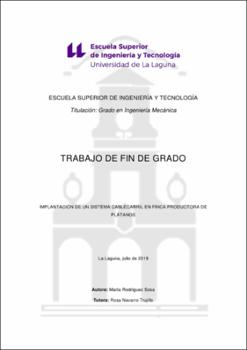Implantación de un sistema cablecarril en finca productora de plátanos
Author
Rodríguez Sosa, MartaDate
2019Abstract
Banana plantation is the most significant subtropical crop of the
agricultural economy of the Canary Islands. It is located in the coastal areas of
almost all the western islands of the archipelago and it is cultivated on horizontal
terraces, sometimes on slopes exceeding 15%. The difficulty of mechanization
forces most of the work to be done by hand, and one of the most laborious is the
harvesting of the fruit that is done on shoulders, often transporting distances that
sometimes exceed 75 m. In the transport process, the fruit suffers damages that
detract considerably from its quality, which means a significant reduction in profitability. Other fruit transport systems from the farm to the packaged ones,
such as the cableway, are used successfully in other parts of the world where
banana trees are grown and where the slope is not limiting. And in some farms
of the Canary Islands it is also feasible to implement them. For reasons of scarce
slope and extension, as well as the availability of a packing station, a farm has
been chosen in the municipality of Los Silos, Tenerife, for the design of the
present 2540 meter long cableway project, including the main roads and the
secondary ones. Although the project has had a scope, for the purpose of
calculating its structures, of only three sections of the road, namely 220 m. Given
the identical characteristics of the farm, the profit margen has been extrapolated
to the entire farm, comparing the situations before (without cableway) and after
(with cableway). In this case the economic results are favorable to the cableway
system at 0.023 € per kg transported from the field to the point of stripping in
packaging.





